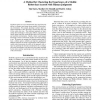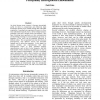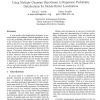2972 search results - page 2 / 595 » Representing the Knowledge of a Robot |
IROS
2009
IEEE
14 years 3 months ago
2009
IEEE
— This paper explores methods and representations that allow two perceptually heterogeneous robots, each of which represents concepts via grounded properties, to transfer knowled...
IROS
2007
IEEE
14 years 2 months ago
2007
IEEE
— Affordances represent the behavior of objects in terms of the robot’s motor and perceptual skills. This type of knowledge plays a crucial role in developmental robotic system...
AAAI
2000
13 years 10 months ago
2000
If robotic agents are to act autonomously they must have the ability to construct and reason about models of their physical environment. For example, planning to achieve goals req...
FLAIRS
2009
13 years 6 months ago
2009
As robots become more common, it becomes increasingly useful for them to communicate and effectively share knowledge that they have learned through their individual experiences. L...
ICRA
2000
IEEE
14 years 3 days ago
2000
IEEE
A new mobile robot localization technique is presented which uses multiple Gaussian hypotheses to represent the probability distribution of the robots location in the environment....



